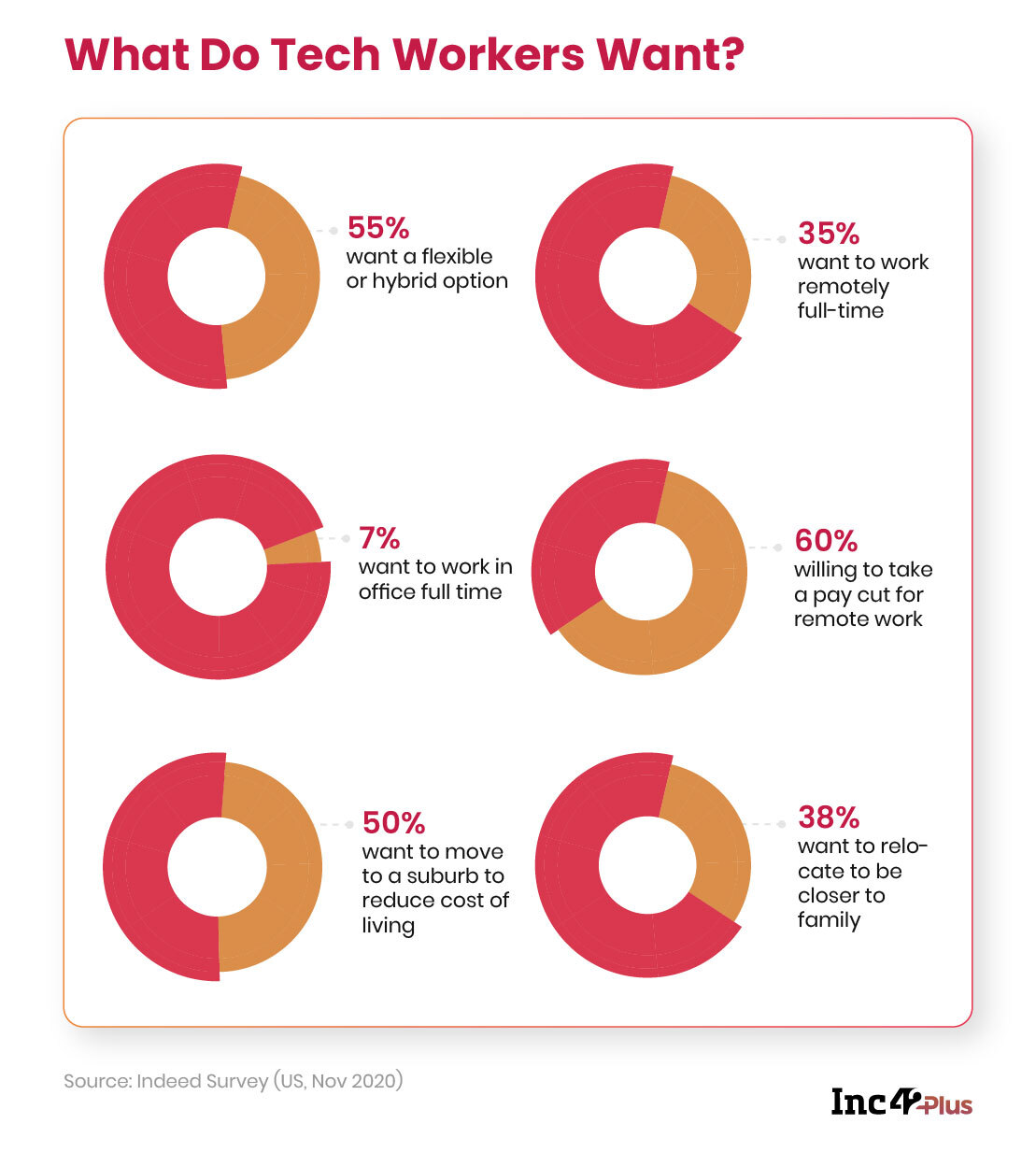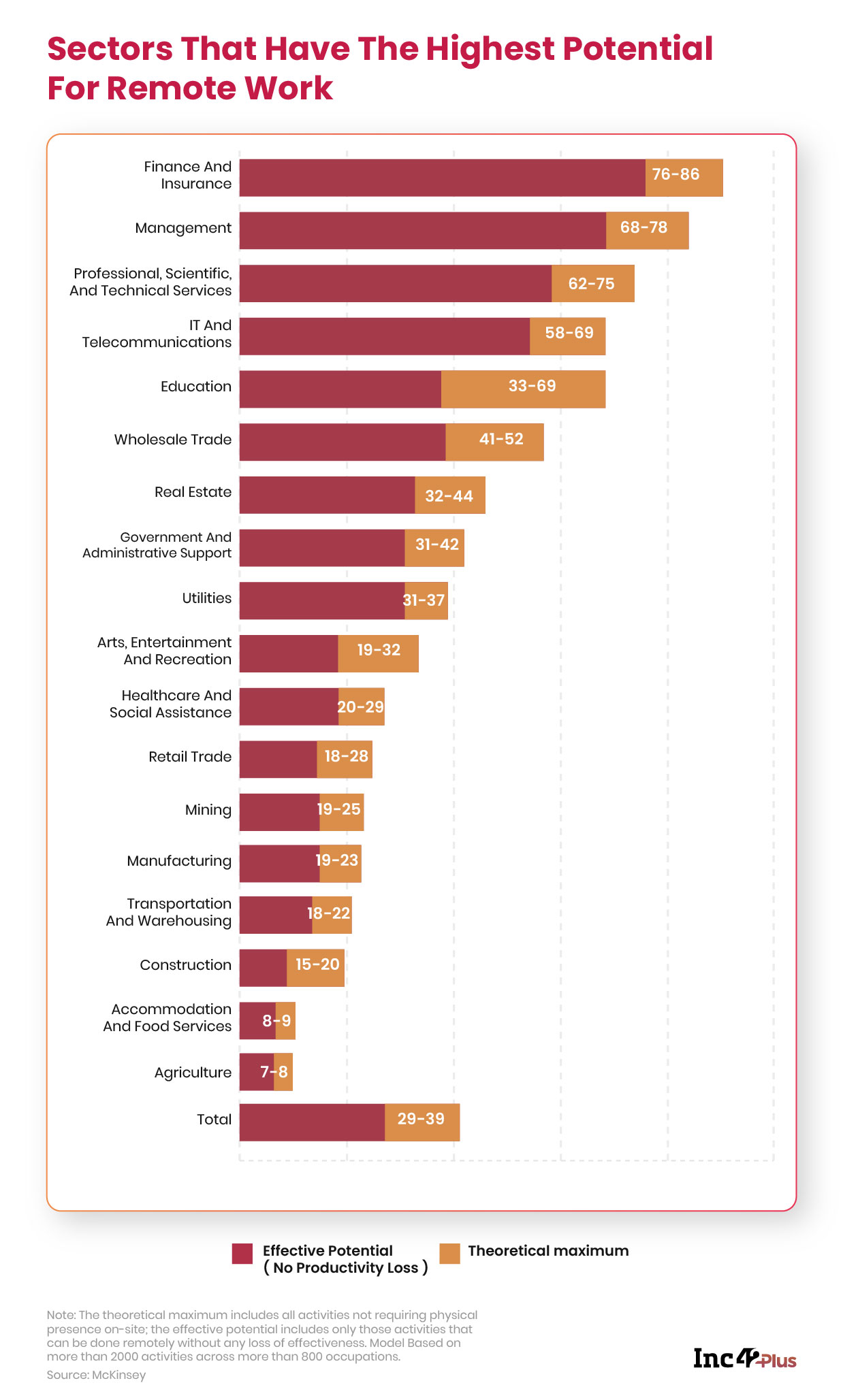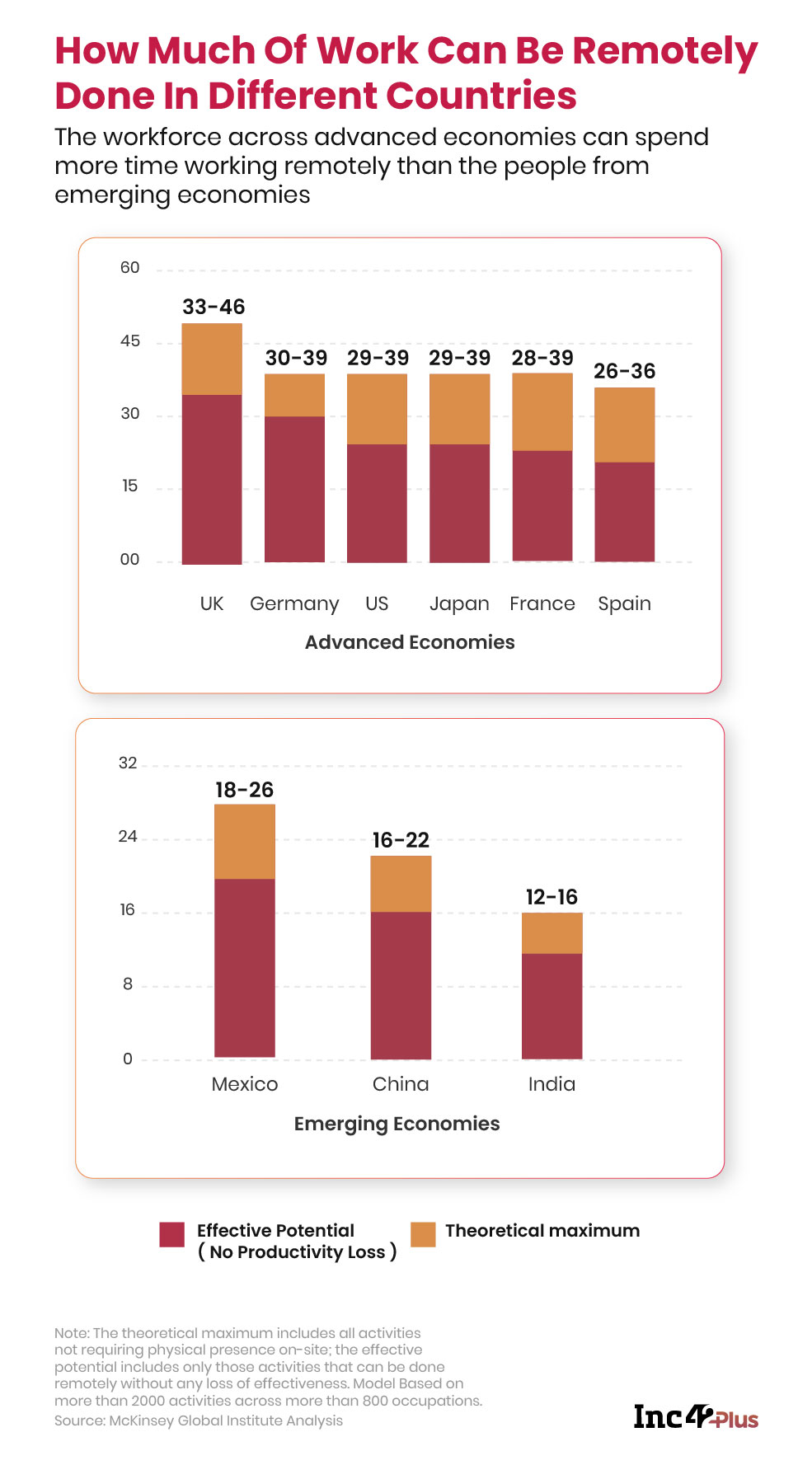Tech startups are struggling to balance remote work, hustle and happiness
Covid19 Tech Impact
Latest updates & innovations, in-depth resources, live webinars and guides to help businesses navigate through the impact of the COVID19 pandemic on India's economy.
Dear Reader,
There can be no silver lining to the Covid-19 pandemic that has claimed more than 3 Mn lives worldwide and caused 2.4 Lakh deaths in India till now. But a black swan event like the ongoing pandemic is bound to impact many existing social norms and business practices.
As the second wave of the pandemic ravages India, the founders of several Indian startups are rising to the occasion and helping their teams cope with the unprecedented crisis. Many of them point out that their employees feel vulnerable in these trying times just like the rest of the workforce in other sectors and should have enough time and flexibility to ensure professional and personal well-being. Such hand-holding is the need of the hour as job-related issues often add to the pandemic stress, overwhelming people and leading to burnouts.
Indian startups OYO and Swiggy have already adopted new work norms such as four-day work weeks and infinite paid leaves. However, the only change that is likely to last even when the pandemic subsides is remote work or work from home (WFH), say experts.
“I am all for four-day work weeks during the pandemic when people are stressed and have families to look after. But is it something that startups should adopt in normal times? Not really. I feel startups epitomise hard work, especially at an early stage,” says Rajesh Sawhney, a serial entrepreneur and angel investor. “However, remote work is a sustainable model, and we are most likely to move into a hybrid work culture post-pandemic,” he tells Inc42.
Interestingly, Sridhar Vembu, the founder of the storied SaaS unicorn Zoho, has been working from a Tamil Nadu village since the outbreak of the pandemic last year. He recently applauded Nithin Kamath, the founder and CEO of the Bengaluru-based bootstrapped fintech unicorn Zerodha, for implementing a system that will allow most of its employees to work from home permanently if they choose to do so. “We have to decongest urban areas and create work opportunities in rural India as our cities cannot grow any bigger,” says Vembu whose company employs more than 10,000+ people.
But that does not mean most technology startups are warming up to the idea of remote work beyond the pandemic. According to a survey published by the job site Indeed in March this year, digitally agile Indian startups indicate that they will revert to the in-office model post the pandemic. In fact, 90% of the companies have said that they are not likely to continue remote working once a solution for the pandemic is in place.
However, a similar survey of the U.S. tech workers in November last year shows that nearly half of them (48%) already have the option to work from home permanently although they were not doing so in the pre-Covid period, and 95% intend to take their employers up on this offer. Six out of 10 employees are even willing to take a pay cut to continue working from home.

Rebooting The Tech Workspace
Going by overall employee sentiment, Google is set to launch a hybrid work model that will allow 60% of its employees to work in the office only three days a week. About one-fifth of its staff can work from home and the remaining 20% may work from a different location altogether.
Many big tech companies, including Salesforce, Facebook and Amazon, among others, have gravitated toward this hybrid model that will see a combination of in-office and WFH employees. Then again, companies like Spotify have asked their employees to work from anywhere they like.
In sync with the global trend, some tech companies in India are also contemplating a similar shift. For instance, Kamath of Zerodha has focussed on identifying and meeting employees’ preferences. First, a survey was conducted among employees to find how many wanted to continue remote work. When the results showed that an overwhelming majority preferred not to come to the office, the company evaluated which roles could go remote and who needed to be in the physical workplace. “Although 95% people can execute their tasks working from anywhere, a core team of 40-50 need to be present in the office,” says Kamath.
One of the most people-intensive roles at Zerodha is customer support, earlier carried out from call centres. But due to the startup’s WFH policy, processes had to be overhauled for a large number of employees and customer support executives are no longer monitored through punch-in and punch-out timings. Instead, service parameters depend on the number of requests answered in a day or total login time. Implementing such changes takes time, but according to Kamath, the company’s preparations to stay fully remote (even after the pandemic) started well in advance, although the announcement came recently.
But there is one critical issue that has become a hallmark of remote work. As the lines between work and personal spaces have blurred, employees feel they are on a switch-on, switch-off mode all the time and have to make themselves available to coworkers even outside their work hours.
To ensure a better work-life balance, Zerodha has mandated that there will not be any work-related chats among employees on holidays or after 6 p.m. on working days. Further, all workplace communications should be limited to its internal chat tool. Besides, the customer support team need not be available and answer calls until 8 p.m. as the regular trading session ends by 3:30 p.m. “Our customer support is now available till 6 p.m., and users have made peace with it,” says Kamath.

Pandemic-Induced Brain Drain
While Zerodha-like work norms may work for most teams across organisations, technology is an entirely different ballgame. “Software development is creative work — it is karigari (craftsmanship) and not mazdoori (routine work). People in these roles may stay logged for eight hours, but the real deep work happens only for two or three hours. What’s more, you cannot push them to work and give it their best shot when they are not feeling like it,” says Sidu Ponappa, senior vice-president of engineering at the Indonesian tech startup Gojek. The company, in a sense, was working remotely even before the pandemic as its core software team had always been located in India.
Global technology companies like Facebook, Apple and Google have been hiring tech talent from India for the past 10 years for their local and global offices, but the pandemic has thrown open an entirely new possibility. With remote work becoming a norm worldwide, more people can qualify for openings abroad and work seamlessly across borders. This means tech startups in India will have to compete with tech giants who can pay salaries that go through the roof and further contend with mid-sized and small companies from the US Europe who pay in dollars and euros.
“The silver lining is that you know you are doing things right if you are losing people to the San Francisco, London or Berlin offices of tech giants,” said Ponappa of Gojek. “Facebook, Apple, Amazon, Netflix and Google started early hirings as they had the muscle to deal with visas to bring in talent. Now that remote work is becoming a real thing, the barrier to global hiring is dramatically lower. So, more and more companies are hiring talent wherever they can find them because the new employees need not relocate,” he added.
To ward off a possible resource crunch, startups at home need to reinvent their work norms and streamline processes to compete in a global market for talent. Startups will also have to realign their culture to fit ‘employee happiness’ in their people management framework. According to Ponappa, this will require companies to consider remote work not as an HR policy for making hires on smaller budgets but as a core company strategy.
At a time when tech startup founders are complaining about the growing war for talent and the subsequent rise in salaries that may hurt their budget, it may not be easy to pause and take a holistic view of what their team members want. But until it is done, it may not be long before Twitter is populated with memes that read: Hustle is great. But have you ever had happiness?

Lest We Forget
While the debate on hybrid workplace continues, India lost one of its pioneers in the area of robotics. Rajeev Karwal, the founder and chairperson of the robotics company Milagrow, succumbed to Covid-19 on Wednesday (May 12) morning. He was on ventilator support for almost a week.
Delhi-NCR-based Milagrow HumanTech has developed a ‘Humanoid ELF’ that enables doctors to monitor and interact with Covid-19 patients remotely so that healthcare professionals will not contract the disease. In an earlier interview with Inc42, Karwal said that the robot was developed at the request of AIIMS. “We thought we could install certain applications in our existing robots to help doctors talk to the patients without meeting them.”

Banding Together For Helping The Pandemic-Hit
The second wave of the Covid-19 pandemic in India has brought a tragedy to almost every home. But it has also been proved that Indians do not lack empathy or community action. From startup founders to citizens at large, people all over the country have come together to help the pandemic-stricken in need.
One such group to join the growing list is CovidCitizens.org, a collective of startup founders, technologists and non-profit organisations. As Wakefit cofounder Chaitanya Ramalingegowda told us, the goal behind the platform is to bring some semblance of structure and organise data around the availability of medicine, oxygen and hospital beds to help citizens beat the resource crunch during the current crisis.
The volunteer-run group organises and structures information related to medical resources from on-ground suppliers and helps meet the requirements of Covid patients through various digital mediums such as voice-based channels, WhatsApp, helplines and social media.
But as techies are innovating to help the country in these critical times, they are also wondering if they can effectively help densely populated cities like Bengaluru (6.8 Lakh cases), Delhi (13.72 Lakh cases), Mumbai (10.14 Lakh) and Pune (9.56 Lakh), which have cumulatively recorded about 4% of the total cases in India.
It is quite possible that many startup employees working in these cities will not want to return to their physical offices. Most people may prefer to work from a safe haven (their homes, to be precise); some may want to work from beach shacks, while others may like the serenity of the mountains. As cultural commentator Janan Ganesh puts it, “In an age of bespoke entertainment, of bespoke everything, the office asserts the essential sameness of all people. It pretends that one person’s refreshingly brisk temperature is not another person’s cryogenic shock.”
It will be interesting to see how technology startups, which vouch for bringing about a digital transformation and personalise every aspect of human life, go about transforming their own workplaces.
Until next time,
Deepsekhar




![[The Outline By Inc42 Plus] Do Tech Workers Want Offices To Reopen?](https://inc42.com/cdn-cgi/image/quality=75/https://asset.inc42.com/2021/05/Outline_65_Feature1360X1020.jpg)





![[The Outline By Inc42 Plus] What is Holding Back India’s Healthtech?](https://inc42.com/cdn-cgi/image/quality=75/https://asset.inc42.com/2021/05/Outline_64_FeatureImage_Final-03-490x367.jpg)


![[The Outline By Inc42 Plus] Do Tech Workers Want Offices To Reopen?-Inc42 Media](https://asset.inc42.com/2023/09/featured.png)
![[The Outline By Inc42 Plus] Do Tech Workers Want Offices To Reopen?-Inc42 Media](https://asset.inc42.com/2023/09/academy.png)
![[The Outline By Inc42 Plus] Do Tech Workers Want Offices To Reopen?-Inc42 Media](https://asset.inc42.com/2023/09/reports.png)
![[The Outline By Inc42 Plus] Do Tech Workers Want Offices To Reopen?-Inc42 Media](https://asset.inc42.com/2023/09/perks5.png)
![[The Outline By Inc42 Plus] Do Tech Workers Want Offices To Reopen?-Inc42 Media](https://asset.inc42.com/2023/09/perks6.png)
![[The Outline By Inc42 Plus] Do Tech Workers Want Offices To Reopen?-Inc42 Media](https://asset.inc42.com/2023/09/perks4.png)
![[The Outline By Inc42 Plus] Do Tech Workers Want Offices To Reopen?-Inc42 Media](https://asset.inc42.com/2023/09/perks3.png)
![[The Outline By Inc42 Plus] Do Tech Workers Want Offices To Reopen?-Inc42 Media](https://asset.inc42.com/2023/09/perks2.png)
![[The Outline By Inc42 Plus] Do Tech Workers Want Offices To Reopen?-Inc42 Media](https://asset.inc42.com/2023/09/perks1.png)

![[The Outline By Inc42 Plus] Do Tech Workers Want Offices To Reopen?-Inc42 Media](https://asset.inc42.com/2023/09/twitter5.png)
![[The Outline By Inc42 Plus] Do Tech Workers Want Offices To Reopen?-Inc42 Media](https://asset.inc42.com/2023/09/twitter4.png)
![[The Outline By Inc42 Plus] Do Tech Workers Want Offices To Reopen?-Inc42 Media](https://asset.inc42.com/2023/09/twitter3.png)
![[The Outline By Inc42 Plus] Do Tech Workers Want Offices To Reopen?-Inc42 Media](https://asset.inc42.com/2023/09/twitter2.png)
![[The Outline By Inc42 Plus] Do Tech Workers Want Offices To Reopen?-Inc42 Media](https://asset.inc42.com/2023/09/twitter1.png)




 Ad-lite browsing experience
Ad-lite browsing experience